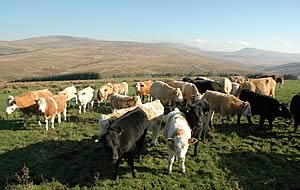|
13/12/07
The Scottish Government and the Welsh Assembly should initiate
an urgent public debate with its livestock farmers so that the
pros and cons of a vaccine policy against bluetongue are fully
examined and an informed decision on the treatment of the disease
in Scotland and Wales is taken.
So says National Beef Association which is aware that Defra has
tendered for sufficient doses to cover the vaccination of the English
cattle herd and sheep flock next summer because it expects bluetongue
to circulate again next year.
And Defra may also be prepared to extend the current protection zone to cover
all of England’s counties so that any cattle or sheep farmer can take part
in a cross-England vaccination protection programme.
“There is a view in England that as long as the vaccine is cheap, that
is in the region of 50p a dose, a voluntary programme could suit farmers best
because they can weigh the cost of vaccination against the known damage bluetongue
infection can inflict on reproduction cycles and growth performance and decide
which animals to inoculate,” explained NBA.
“English farmers could also measure the cost of disposing of bluetongue
fatalities, which could become more common as animals are bitten more often by
infected midges, through the Livestock Disposal Scheme, against the cost of vaccine
and if vaccination was voluntary farmers could choose to carry out the operation
in the same way they would do against BVD or any other viral disease.”
According to National Beef Association Scotland confirmation of such moves in
England could have a profound impact on the value of store and breeding stock
in Scotland and Wales as well as offer opportunities for the Scottish Government
and Welsh Assembly to join in an all-Britain initiative to suppress the economic
damage that could be inflicted on the Scottish and Welsh industries if, or when,
bluetongue becomes endemic.
“Decisions are easier in England because the disease is already circulating
within its borders while in Scotland and Wales there is still debate on whether
there will ever be a bluetongue outbreak and the Scottish Government and the
Welsh Assembly has yet to decide whether to order any vaccine,” said Ms
Haywood.
“However the Scottish and Welsh industries should realise that if England
does embark on a vaccination programme buyers from England who are looking for
Scottish and Welsh stock will not want to buy unprotected animals and the Scottish
Government and the Welsh Assembly should also acknowledge that some Scottish
and Welsh farmers will want to protect their businesses against the disease.”
“A number of issues will have to be thoroughly probed before a decision
is made. These will include whether government and industry are prepared to anticipate
the disease by including Scotland and Wales in an extended protection zone so
that vaccination can take place - or whether it would be better to wait for an
outbreak to be confirmed in Scotland or Wales first.”
“But decisions expected to be made in England could make the absence of
vaccine availability in Scotland and Wales work against the interests of many
livestock businesses and it will be impossible for the Scottish Government and
Welsh Assembly to enjoy the benefit of having a full range of options at its
disposal if it has not ordered vaccine and there is none to hand,” Ms Haywood
added.
 Joint Disease Initiative Should First Tackle Government Inefficiency Joint Disease Initiative Should First Tackle Government Inefficiency
 Relief as Ewe Payment Set to Hit Bank Accounts Relief as Ewe Payment Set to Hit Bank Accounts
 NFUS Urges Prompt LFASS Payments Despite SRDP Delay NFUS Urges Prompt LFASS Payments Despite SRDP Delay
|



